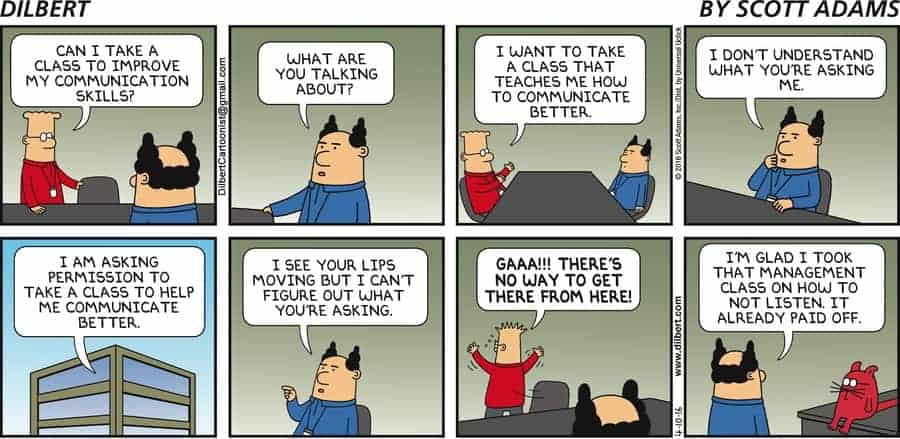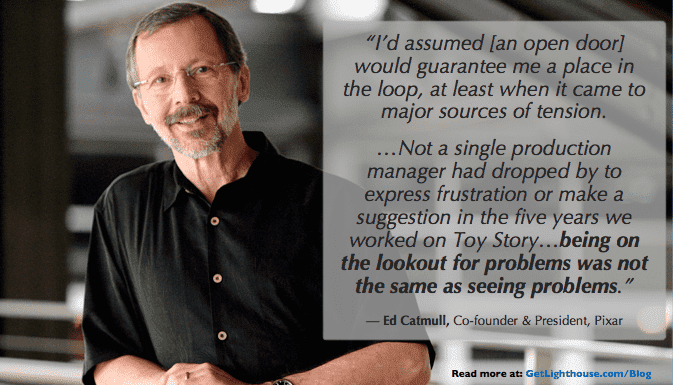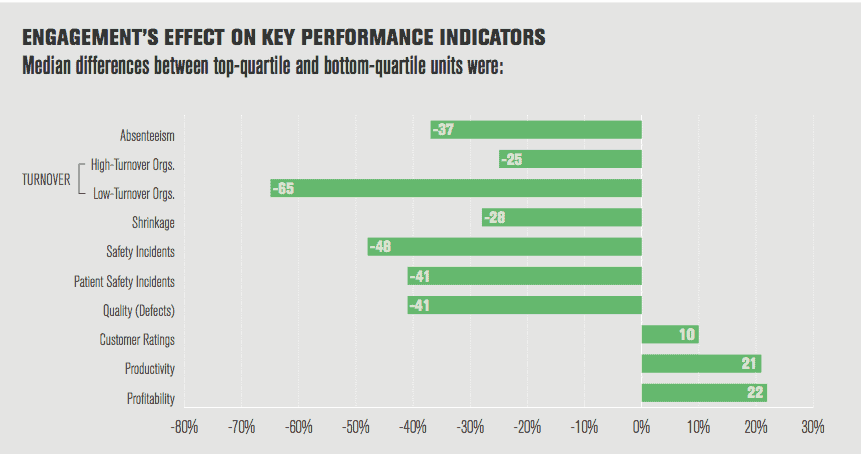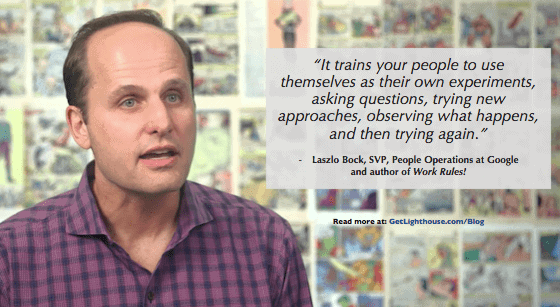A Lighthouse reader emailed recently asking the important question, "How can I set up expectations each way without sounding like a child when I say, "I'd like weekly one-on-ones!”
First of all, it's a very mature decision to ask for 1 on 1s; you are telling your manager you want to have strong, effective, structured communication with them. That's a win-win for everyone.
However, your mindset is really important when you try to convince your boss; if you mistakenly thought it was childish to ask, they may treat it like a childish request. Meanwhile, if you ask confidently and present the value of the meeting from their perspective, you're much more likely to get a positive result.
Your boss is innocent until proven guilty.
Unfortunately, there are cases where employees know more about good management habits than the person they report to. Through no fault of your boss, this can happen for a variety of reasons:
- They're a first time manager
- No one ever taught them what to do
- They've never had an example of good management habits to follow
If you're in a position like our reader, the best thing you can do is come in with a positive mindset and prepared to help them understand why this is a good idea.
Today, we help you prepare for this discussion, and start your 1 on 1s in the best way possible once you convince your boss.
How to Convince Your Boss to Start 1 on 1s with You
As Dale Carnegie describes so well in his timeless leadership classic, How to Win Friends and Influence People, you need to think about your manager's perspective. The best way to convince your boss is to show them how they will benefit from making time to meet with you.
Here's some of the best benefits managers regularly get from 1 on 1s that your manager could experience, too.
1) Stay on the same page and better manage up
Whether you're managing individual contributors or have multiple teams reporting up to you, feeling out of the loop is common. Your manager is no different.
One of the easiest ways to cure that is more communication, and a weekly scheduled meeting can help.
Now, that still means you need to avoid having your 1 on 1s become status updates, but there's more to feeling in the loop than a basic status report. When you work with them to manage up, you can tailor the meeting to find out:
- What information do you feel like you're missing that you need to know to do your job better? Work with them to create a simple update you send them, and discuss how to improve it in your 1 on 1.
- At what level is a problem important enough I should raise it with you? What is the best way to do so? Help them get out of reactive management mode by catching and fixing problems when they're small.
- How would you like me to present things to you I would like your coaching on? Your manager sees only a small fraction of your work, so being proactive about where you want feedback and coaching can be huge for both of you.
If you're lucky, this alone will be enough to convince your boss to start 1 on 1s. However, there's a few more talking points we have for you to further open their mind to great topics that benefit them in these meetings.
2) Help them avoid interruptions
Some managers think that having an open door policy is enough to give their people a chance to talk to them. Unfortunately, that fails on a lot of fronts:
- If they're in a lot of meetings, they're not there when people want to open the door.
- If someone works remote or in another time zone, the opportunity is limited.
- Even if they're in the office, they may not have time when someone wants to drop in.
A good, productive 1 on 1 meeting is many times better because it's certain to happen, and you have enough time to dig into things.
When you're trying to convince your boss, remind them how you won't have to randomly interrupt them anymore. Instead, you can just add it to the agenda for your 1 on 1 unless it's absolutely urgent. Reducing interruptions gives them more time to focus, and less pressure to be available at random times.
If your manager needs more convincing about open door policies failing, this post can help with more stories and evidence why they fail.
3) Promise to come prepared
"So what do you want to talk about?"
"I dunno."
"How's it going?"
"Okay."
If that's the kind of exchanges that happen in your 1 on 1 meetings, you won't have them for long.
Unfortunately, for some leaders and employees, that's the extent of their experience with these meetings. It makes a manager feel like they're a waste of time.
Therefore, the best way to convince your boss in this situation is to emphasize the effort you will put into preparation. If you can give them an idea of the topics you want to cover, they're more likely to be willing to try it with you.
Even better, have your first 1 on 1's agenda ready when you suggest starting them. It's hard to say you won't prepare if you already have!
Again, this all comes back to efficiency. If you show up with an agenda you can work through together all of them at once, which could save dozens of emails, interruptions, and "can we talk about this another time" situations.
Go all the way, if you have to
You can really dial up the preparation for your overwhelmed or resistant manager, too. Offer to handle scheduling as well.
However, if you do this, be careful! Pick a time you know they're likely to keep; if you pick a time you like but they can easily get pulled into other things, then it won't work. Instead, choose a time they prefer, or that from what you know of their habits is less likely to be problematic.
If you need more tips about preparing, these tips can help you build a great agenda.
4) Share the value others have gotten from 1 on 1s
One on ones have been around for a long time. Ever since the white collar office environment developed, great leaders have been making time to check in with the people they manage.
Fortunately, with the technology available today, a lot of research has been done on the value of 1:1s. In our time working to convince people to start 1 on 1s, this one reported in Harvard Business Review seems to stand out most:
"What happens when a manager doesn't meet with employees one-on-one at all?
Employees in this situation are four times as likely to be disengaged as individual contributors as a whole, and are two times as likely to view leadership more unfavorably compared to those who meet with their managers regularly.”
So you and your colleagues are 4 times more likely to be checked out or going through the motions, and think all of company leadership are poor because of it without 1 on 1s. And for the budget and numbers-driven manager, this disengagement hits the bottom line in a variety of ways:
While it may be too much to convince your boss to have 1 on 1s with everyone, you can use this information to plant the seed to do so in the future.
There's a variety of studies and anecdotes out there showing the value of 1 on 1 meetings, and we have more evidence and talking points for you here if needed.
5) Call it an experiment
Finally, the last thing you can do to ensure success is call it an experiment. This has a variety of benefits:
- Temporary - You give them a chance to try it instead of feeling like an endless commitment.
- Measured - Experiments have definitions of success you can work towards. This helps make sure you're both evaluating the value of meeting with you, and realizing how it's helping.
- Flexible - Rather than looking at it as a fixed habit. Experiments can lead to new insights so you can adjust the time, frequency, topics, etc to make the meetings better and better.
The vast majority of managers appreciate when their team members come to them with good ideas with a plan for how to implement them. Confidently walking up to them and saying something like,
"I want to ensure we have regular, open communication. This way we stay on the same page and can tackle challenges together. Are you familiar with the concept of 1 on 1s? I'd like to experiment with you by having them weekly to start, and we can adjust based on how we're doing."
If they need further convincing, from there you can go over some of the talking points above and listen to their concerns.
As long as you frame it as an experiment and benefits for them, they're likely to at least try it.
If not, at least you know you put your best foot forward, and can consider if you want to continue working for someone that doesn't value meeting with you.
Next steps:
Once your boss is convinced to try 1 on 1s with you, if you feel they'll appreciate it, you can send them some of our links to help them understand, like one of these:
- 1-on-1 meeting with manager template
- A variety of questions they can ask in 1 on 1 meetings to spark valuable discussions
- And here's an approach you and they can use to ensure the meeting is great before, during, and after.
Are you and your managers wasting their 1 on 1s?
There is no greater investment to make in your team than having 1 on 1s. Yet, done poorly they’re a huge waste of time.
That’s why we made the 1 on 1 Master Class. You and your fellow managers learn step by step how to supercharge these meetings to motivate your teams, fix problems, coach your people, and much more.
You can learn how Lighthouse Lessons can help your leaders like we helped SeedBox Technologies by signing up here.












